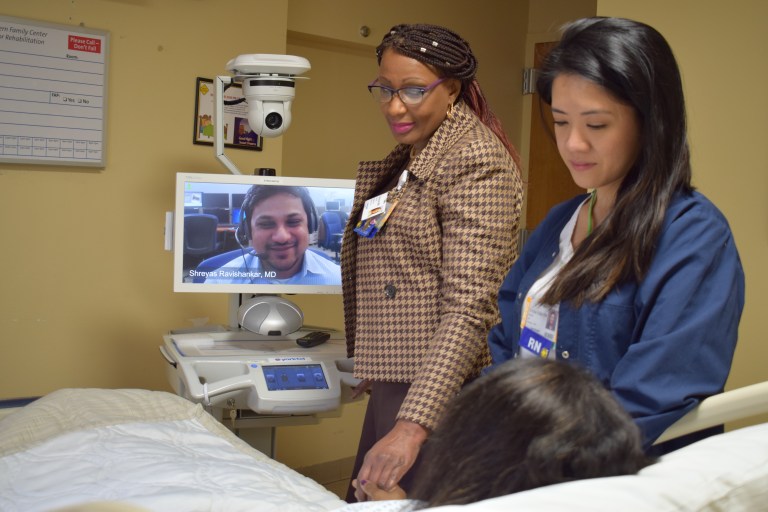
The Northwell Health Stern Family Center for Rehabilitation has launched a telemedicine program to provide clinical bedside support using two-way video communication to assess and diagnose clinical problems and minimize hospital readmissions at the 256-bed subacute care facility.
While Northwell hospitals have employed telemedicine in its intensive care units and emergency departments for the last three years, Stern is the first skilled nursing facility in its network to implement telehealth technology.
“Telehealth meets our specific needs with a large sub-acute population given the acuity of our patients,” said Dr. Howard Guzik, the facility’s medical director. “Most skilled nursing facilities don’t have physicians on the premises 24/7. To provide around the clock access to physicians, we invested in two portable telehealth carts. If an acute medical situation arises, a cart is wheeled into a patient’s room and a nurse supervisor can access a consultation with a physician in real-time.”
In the past, if a patient’s condition changed after physician hours, clinical staff relied on telephone consults with doctors or transported them to nearby North Shore University Hospital, Guzik said.
The telehealth carts are linked to Northwell Health’s Telehealth Center in Syosset. The technology includes the use of two-way cameras, monitors and computer programs that transmit information between patients and the command center where intensivist or critical care physicians and nurses have real-time access to a patient’s vital signs and cardiac rhythm. Electronic medical records also are easily accessed. There is a microphone and speaker in the room to allow direct communication between bedside health care providers at Stern and patients or family members.
The first telehealth consult at Stern took place last month when, sometime around midnight, nurses noticed that a 92-year-old patient developed a fever and showed signs of weakness. Staff, concerned about infection, activated the service. On clinical shift at the command center that night was Dr. Saurabh Chandra, medical director of Northwell’s electronic ICU.
“With telehealth, we get a better picture of the patient when we lay our eyes on him or her in real time,” Chandra said. “Within minutes nurses at Stern were able to start an IV line for the patient and start fluids. Antibiotics were given and diagnostic tests were ordered. The team was able to get lab results in a two-hour turnaround, showing Stern’s capabilities. If you can take care of a patient in-house, it makes it easier on the patient. In this case an unnecessary hospitalization was avoided.”
Patients at a skilled nursing facility, many of whom are elderly, could experience a range of health issues, including exacerbation of congestive heart failure or COPD, urinary infections, pain syndromes and changes in condition, which are diagnoses that can be assessed by telehealth.
“Telehealth technology is evolving and we are happy to add this critical service to Stern,” said Gerard Kaiser, executive director of skilled nursing facility services at Northwell Health. “Telehealth is an extra reassurance for patients and families to have access to physicians 24/7.”
Stern is located on the campus of North Shore University Hospital. It specializes in short-term rehabilitation, skilled nursing and extended care services. Stern has been awarded five out of five-star rating for overall quality from Centers for Medicare and Medicaid Services, placing Northwell Health Stern Family Center for Rehabilitation in the top 10 percent of nursing facilities in the country.







I glad to learn the initiatives made to promote telemedicine.
Telemedicine has several advantages over the traditional model of health care practices. Besides, it is cost-effective as well as helps to save the time of a person suffering from a health-related issue. Telemedicine helps to provide health care services in a remote region. So, efforts should be made to promote telemedicine.